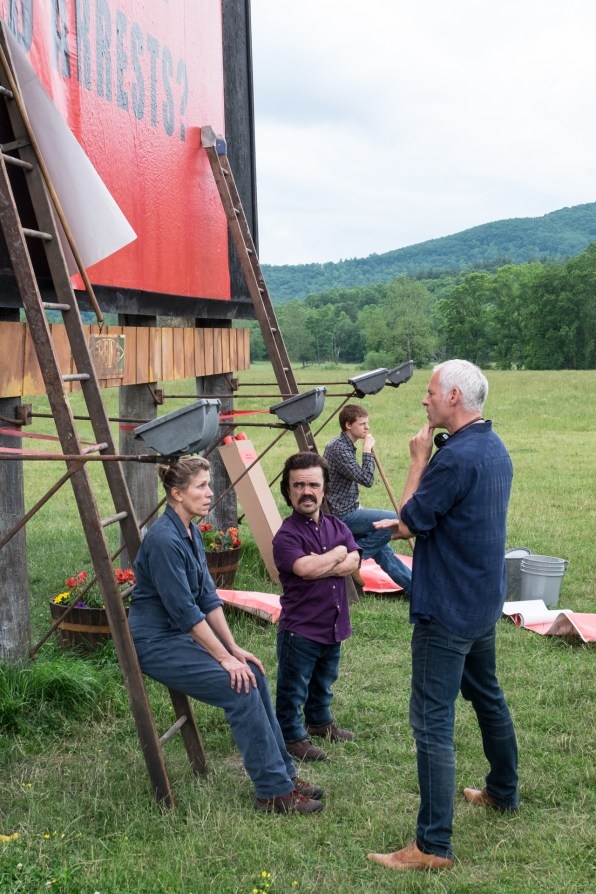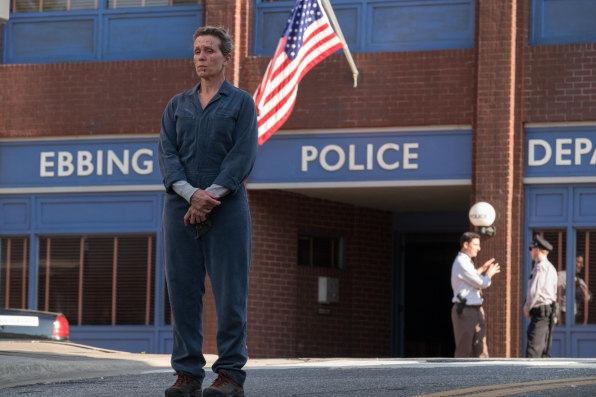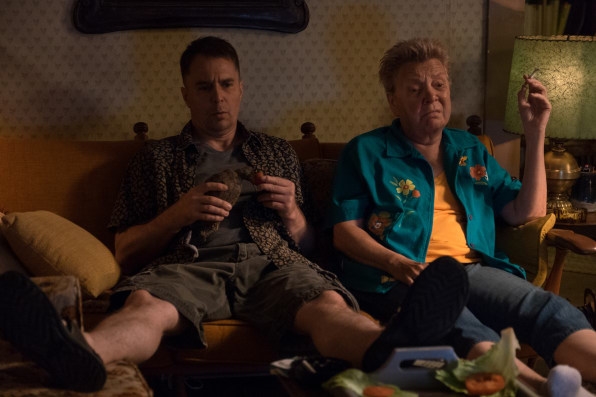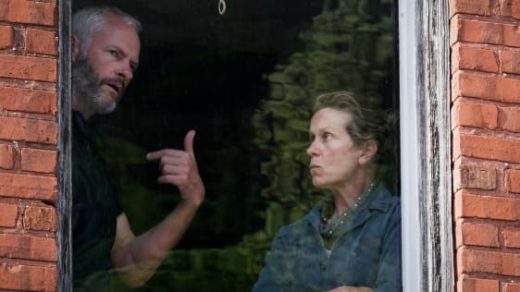How “Three Billboards” Martin McDonagh & Frances McDormand Created Her Best Role Since “Fargo”
God help anyone who runs afoul of Mildred Hayes.
Frances McDormand’s avenging mother character in Three Billboards Outside Ebbings, Missouri is a force–one perhaps beyond the possibility of being reckoned with. She’s not the perfect hero. She’s not even the perfect avenging mother. Some of her actions are downright indefensible. What she is, however, is thrillingly, heartbreakingly human and original—the indelible product of writer-director Martin McDonagh’s desire to write a strong female lead for his new film. Between his imagination and McDormand’s fiery performance, an Oscar shoo-in was born.
“She’s one of the strongest characters I’ve written, but her being a woman is a strong part of that,” says McDonagh, the British-Irish playwright-turned-filmmaker whose 2008 debut feature In Bruges was a breakout indie hit. “The things she does, I don’t think a male lead could get away with it. There’s something about her that just goes beyond.”

Three Billboards Outside Ebbings, Missouri follows Mildred Hayes as she sets out to shame the local sheriff (Woody Harrelson) and his racist deputy (Sam Rockwell) into finally finding the man who raped and killed her daughter. Hayes’s main method of doing so involves some harsh words printed on the titular trio of billboards, but her aggression is often even more in-your-face. Hayes is blunt and ultra-deadpan. She swears like a sailor and takes a hard pass on suffering fools. She takes advantage of anyone else’s inclination to underestimate or condescend to a woman–and spits it back in their face. She’s the patron saint of Not Giving a Fuck, totally indifferent to how she’s perceived and how people react to her.
And she was just as much a blast to write as she is to watch.
“There was some joy, for me, just in following everything she does,” McDonagh says. “It was fun to have her in every scene, saying the shit she was saying.”
The character is rooted in McDonagh’s desire to once again write lead characters like the indelible women who dominated his play Beauty Queen of Leenane. After two films lead by Colin Farrell (In Bruges was followed by Seven Psychopaths in 2012) and a testosterone-heavy roster of co-stars, McDonagh wanted to get back to his theatrical roots. He also had been wanting to work with McDormand for a long time, having been a fan of her work since Blood Simple, the Coen brothers’ debut.

“All her characters are just so real,” McDonagh says. “I wanted to tap into that integrity and I knew she wouldn’t sentimentalize or patronize either Mildred or the working class aspect of the story; that it wouldn’t be ‘heroic working class acting,’ that she would just be a mother who has a job that isn’t great–deal with it, it’s not part of the story.”
Fortunately, the filmmaker and performer together formed a mutual admiration society. McDormand, who won a Best Actress Oscar for 1996’s Fargo, had seen Beauty Queen of Leenane during its New York run in 1998. She was so affected by the piece that she reached out to McDonagh and suggested he write a role for her. It took him nearly 20 years, but McDonagh eventually made good on the request. Now, the pair’s slow-gestating collaboration is earning some of the best reviews of their careers.
Beyond knowing he wanted to make his next film with McDormand, the idea for Three Billboards began to take shape when McDonagh conceived of what would be written on those billboards. The trisected message, which is as much a challenge as a declaration of war, is: (1) “Raped While Dying,” (2) “And Still No Arrests?” and (3) “How Come, Chief Willoughby?” From the details on these then-hypothetical billboards, McDonagh began to conjure the melange of anger and fearlessness that comprises Mildred Hayes, as well as the plot mechanics that occur around her.
“Everything else falls into place from there,” McDonagh says. “The reaction to the billboards from the police, her reaction to their reaction–it’s all completely organic from that very first statement she makes, but you also, just by writing these scenes, you tap into the attitude of what a person like that must be.”

[Photo: Merrick Morton/Twentieth Century Fox Film Corporation]
McDonagh has a tendency to give his actors the space to add nuance to their characters’ unseen lives. He lets them come up with backstory and supply details that live beyond the screenplay. In creating Mildred Hayes, McDonagh had some long conversations with McDormand about just what her character has been doing between her daughter’s murder and the moment of her billboard epiphany.
“We decided it was all about depression and pills and staying in bed and being completely broken,” McDonagh says. “When she gets to the point we meet her, there’s been a change–either on the day before or in that moment itself, there’s a change. It’s the decision about the billboards that pulls her out of everything and that’s why there’s no going back and no quarter given. Because it’s either: She’s going to commit suicide or she’s going to fucking solve this thing.”
The audience can sense that some kind of change has occurred, so we don’t need to see the suicidal thoughts or the pill buffet that preceded it. Mostly, all we need to see is the eerily contained apocalyptic rage on Mildred Hayes’s face, which is part of what McDormand brought to the table. She also came up with the idea of Hayes’s costume: a mechanic-like denim jumpsuit, sometimes accompanied by a bandana.
“I loved the idea that she would have this war uniform almost, that she puts it on and doesn’t change from day to day,” McDonagh says. “It’s like she puts it on and goes to war. That was her decision.”
Her next big sartorial decision will almost certainly involve choosing an outfit to wear to the Oscars, although McDormand has been gloriously ambivalent toward the pageantry of award season. As McDonagh observes, though, she will have some stiff competition. The unusually robust field of potential Best Actress nominees for 2018 includes Lady Bird‘s Saoirse Ronan, The Shape of Water star Sally Hawkins, and Beatriz at Dinner‘s Salma Hayek.
“There are so many great and different woman leads this year, and they’re leads, as opposed to some wishy-washy wife of the main character role,” McDonagh says. “I enjoyed writing one. I’ll do it again.”
Fast Company , Read Full Story
(49)














